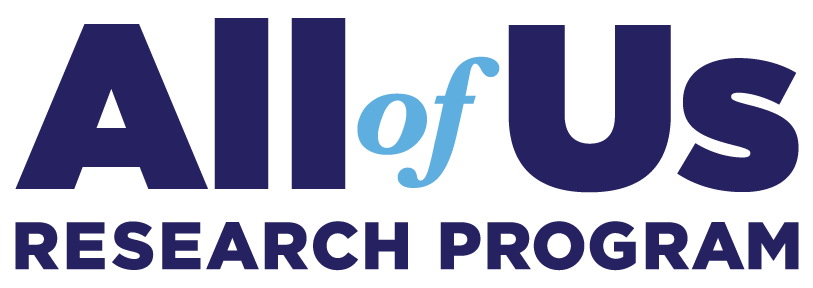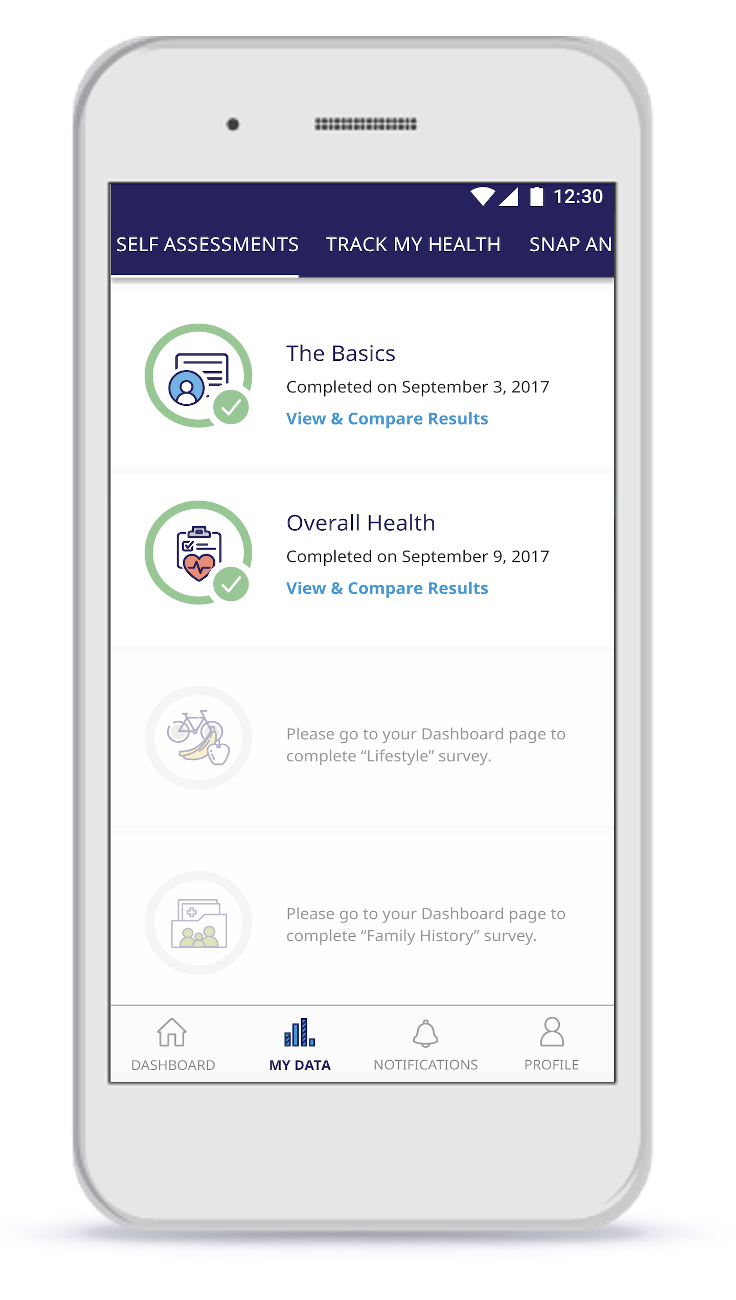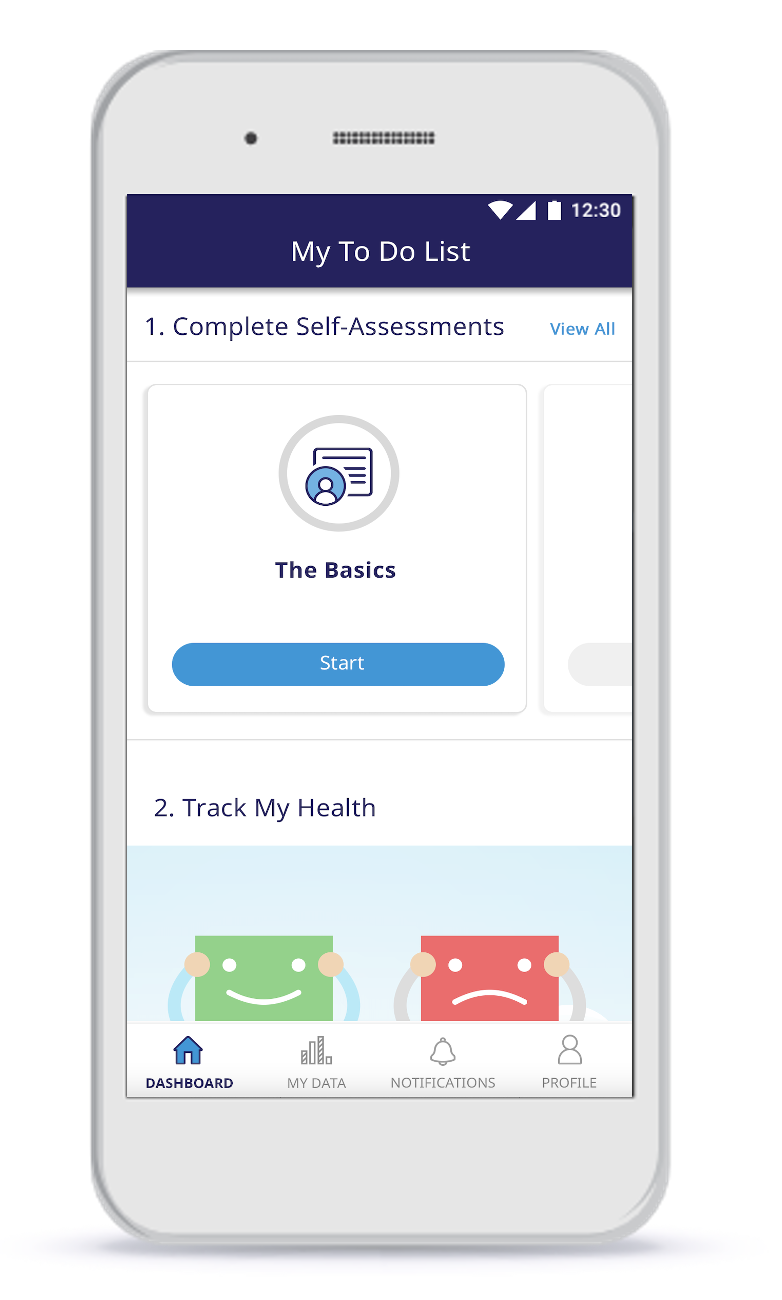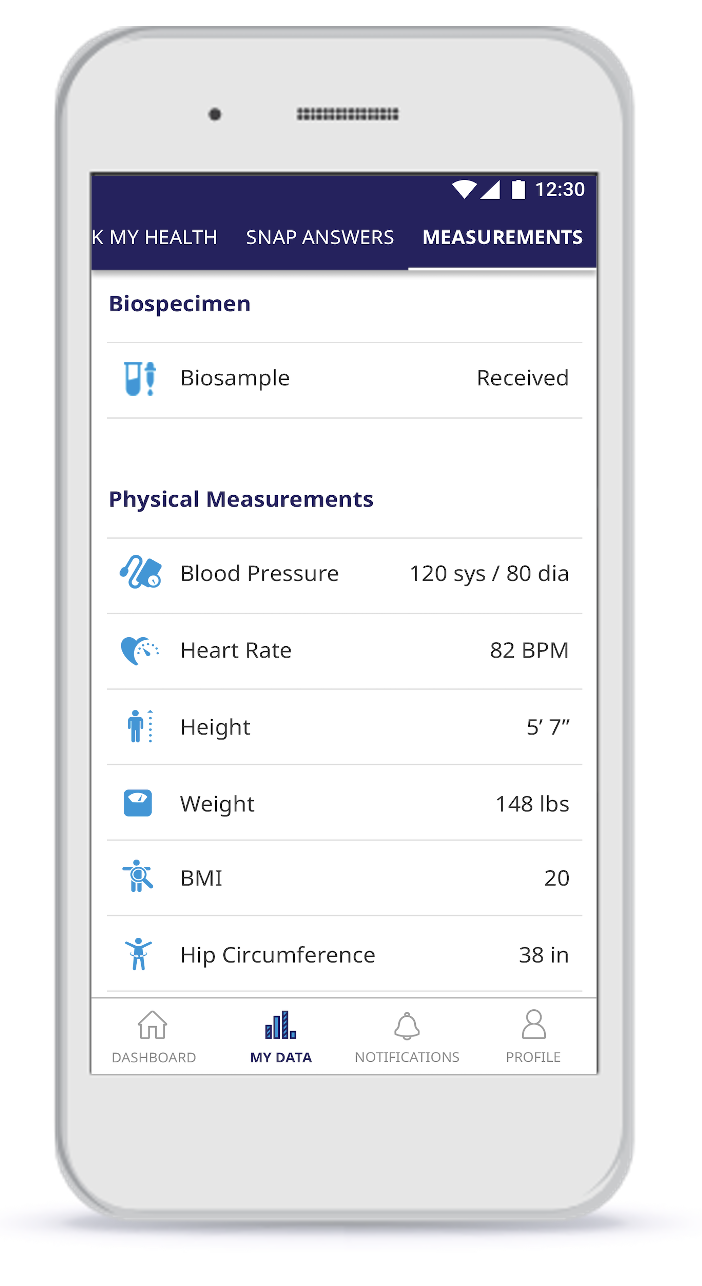Background
Precision medicine is emerging as a more effective way to prevent, diagnose, and treat disease. The success of this approach is in the incorporation of an individual’s unique genetic and phenotypic information, and how those factors can impact the nature of disease.
However, as is the case with much of health care today, the benefits of precision medicine have not been equitably accessible across racial, geographic, socioeconomic, and other measures. Not only does this impact marginalized groups, but the promise of precision medicine can only be achieved with input from a broad population that reflects the true diversity and life experiences of the populace.

The All of Us Research Program aims to deliberately build a cohort of one million participants, with unprecedented diversity, in order to enable research for a wide range of diseases, both common and rare. The magnitude of this cohort has the statistical power to detect associations between genetic and environmental exposures and a wide variety of health outcomes.
The All of Us Research Program also aims to engage participants in line with the evolving culture of health care in the United States. Besides collecting genomic and phenotypic data, the program seeks to actively engage participants in all aspects of the program, including governance, oversight, design, conduct, dissemination, and evaluation.
Scientific Aims
The primary aim of the All of Us Research Program is to build a robust research resource composed of participant-provided information (PPI), environmental, physiologic, genetic, and health data, plus biospecimens from one million or more research participants reflecting the diversity of the United States. This resource will facilitate the exploration of biological, social, and environmental determinants of health and disease.
The All of Us Research Program aims to have the scale and scope to enable research for a wide range of diseases, both common and rare, as well as increase our understanding of healthy states.
Cohort
The All of Us Research Program aims to recruit 1,000,000 or more individuals willing and able to answer questionnaires (PPI), provide biospecimens and physical measurements, share their EHR data, and authorize re-contact. The inclusion criteria for this cohort is:
- Adults 18 and older with decisional capacity to consent
- Currently reside in the United States or a territory of the United States
Participants are enrolled via two modes, whichever is most convenient for the participant: through HPOs or DV sites, using the Participant Technology Services Center, which runs on Vibrent’s platform.
The All of Us Research Program By the Numbers
528,000+
eConsented participants
50%
Racial and ethnic minority
80%
Underrepresented in biomedical research
322,000+
Electronic health records (EHR)
390,000
Biosamples
100+
Funded partner organizations
Approach and Methods for Assessment and Data Collection
The All of Us Research Program chose to award Vibrent Health to develop and run the foundational technologies needed for such large-scale enrollment. Vibrent’s platform powers the Participant Technology Systems Center, which includes a participant-facing portal and participant management tools for more than 100 nationwide program partners.
The study uses the following methods of data collection:
Informed eConsent
Vibrent’s platform provides a flexible, modular, and secure eConsenting process for the All of Us Research Program through its website features. Each module includes the eConsent screens, a formative evaluation, and a form requiring a signature, and these modules cover these processes:
- Primary consent – overview of all program activities, and approval to take part in the PPI, data linkage, physical measurements, biospecimen collection, biobanking, biomarker assays, genomic testing, and sensor/wearable technology activities if invited.
- HIPAA Authorization for Research EHR/Part 2 Supplement – gives details about allowing the research program access to a participant’s EHR.
- Consent for genetic return of results – explains the potential risks and benefits from receiving genetic/genomic results from the program.
Vibrent also supports the All of Us Research Program by managing state-specific requirements for eConsent in these modular forms.
Additionally, the All of Us Research Program manages two eConsent “refresher loop” eConsent screen sets:
- Physical Measurement and Biospecimen Refresher eConsent screens – reminds participants of the scope, limits, risks, and benefits of these procedures.
- Sensor and Wearable Technology eConsent screens – these present a more detailed look at sensor/wearable technology participation, including scope, limits, baseline privacy, and more.

Participant Portal
The All of Us Research Program provides program updates and messages to participants through its participant portal, built on Vibrent’s platform. Through either the participant-facing website or the mobile app, participants are able to access their individual-level information, like responses to PPI questionnaires, values from their physical measurements, their responses to snap surveys, notifications that they have provided EHR data, and information about the wearables they have chosen to integrate.

Participant-Generated Health Surveys
Individuals who join the All of Us Research Program by completing the informed consent process are eligible to start contributing information to the program through the participant portal.
The data collection in these surveys includes:
- Basics (sociodemographic information)
- Overall Health
- Lifestyle (personal habits)
- Personal and Family Health History
- Health Care Access and Utilization
- COVID-19 Participant Experience (COPE)
- Social Determinants of Health
- Medications
- Mental Health
The All of Us Research Program also develops additional surveys using Vibrent’s data collection features on an ongoing basis as needs and opportunities arise.
Participant Wearables and Fitness Tracker Data
Participants in the All of Us Research Program can connect an array of sensor technologies using the participant portal, which runs on Vibrent’s digital platform. Connecting wearables and sensors enables the longitudinal collection of physiologic and environmental data.
The program collects data from sensors and wearables including:
- Smartphone data
- Hardware-based sensors in smartphone handsets (such as gyroscopes, accelerometers, barometric pressure meters, touchscreen features, cameras, microphones, and Global Positioning System)
- Software-based sensors resulting from in-phone features provided by other participant-authorized software
- External device data
- Physical devices that transmit to the participant’s smartphone, using Bluetooth or other similar wired or wireless networking technologies
- Fitbit
- Withings
- Phillips
- Apple HealthKit
- Samsung Health
- Garmin
- Medical-grade technologies like telemetry and continuous glucose monitoring
- Devices that transmit data from a participant-authorized server (including Facebook, Maps, FourSquare, Weather Data, Location Service GIS data, data provided from IoT [Internet of Things] devices, and environmental technologies like home automation tools).
Computer-Assisted Telephone Interviews (CATI)
The All of Us Research Program uses CATI features, part of Vibrent’s digital health research platform, to engage participants in contributing data, particularly those with a range of disabilities of varying degrees and severity (e.g., stamina, communication, cognitive, physical) or who have barriers to accessing technology. This approach helps to increase the survey completion volume for such participants.
CATI is a structured system of data collection by telephone that allows trained program staff to verify participant identity and verbal authorization to proceed, then complete the collection of participant data. Once a CATI session is completed, the participant has access to information submitted within their account.
Biospecimen Sample Collection
Biological specimens are obtained from consented participants for genomic sequencing, including:
- Blood samples
- Urine specimens
- Saliva samples
Electronic Health Record Data
Data collection involving electronic health record data (EHR) is a key contribution of the All of Us Research Program to health informatics research efforts nationwide. Vibrent’s platform manages the eConsent for the program’s acquisition of this data, and integrates with EHR systems to automatically collect participant data for the All of Us Research Program. These datatypes include all parts of the EHR, such as:
- Demographics
- Visits
- Diagnoses
- Procedures
- Medications
- Laboratory tests
- Vital signs
- Health care provider notes
- Radiology
- Messaging
- Reports
- Other testing (e.g., electrocardiograms)

Recruitment and Engagement
The consortium of the All of Us Research Program members use a suite of software tools and services to facilitate participant engagement and retention, built on Vibrent Health’s platform.
These tools and services include resources for scheduling; communications and case management; individual engagement; cohort, sub-cohort, and individual analytics; participant account support; and more.
Study Website
Web-based materials are an important part of the recruitment process in order to educate the large numbers of prospective participants needed to meet the enrollment goal of one million or more participants. The All of Us Research Program hosts IRB-approved materials targeted to the general public on the research program’s website, which is managed on Vibrent’s digital platform. The website includes:
- Videos about the research program in English and Spanish, and with subtitles
- Frequently asked questions
- Messages from program leadership
- Testimonials from participants
Email and SMS recruitment
Study staff reach potential participants through personalized email and SMS messages to existing lists of contacts, including those who have opted in to receive updates and information about the research program. Potential participants can select their preferred method of communication.
Participant incentives
The All of Us Research Program offers participants who travel to an enrollment site for physical measurements and/or biospecimen collection a payment incentive intended as reimbursement for their time and resources spent traveling.
Health care provider organization (HPO) enrollment
The All of Us Research Program enrolls people who are members of an HPO’s health plan and their affiliates or have received care the HPO – directly through that organization. However, any eligible individual who wishes to enroll at an HPO may do so, even if they do not have a prior connection with that HPO. HPOs use Vibrent’s participant management tools to enroll these participants.
Participant engagement
The All of Us Research Program values participants as research partners and employs digital engagement strategies using Vibrent’s platform. The Web and mobile application have been designed to be user-friendly and engaging, with a responsive and intuitive user interface. The program also uses Vibrent’s tools to engage participants through:
- Sending communications and information via email, push notifications or SMS messaging
- Posting snap questions and quick polls along with related facts
- Returning participant information through digital tools
Participant portal
In addition to outbound messages, participants are engaged through the participant portal, run on Vibrent’s platform. Participants can access the portal through the web or mobile application, and gain access to individual-level information about their participation, including:
- Responses to PPI questionnaires
- Personalized educational content
- Values from their physical measurements
- Responses to snap surveys and quick polls, which allow participants to answer a question to see how their responses compare to aggregated responses from the cohort
- Notifications that they have provided EHR data
- Information about the wearables they’ve connected
Return of results
Participants do not have to receive information such as genetic sequencing data and wearable sensor data, but are able to do so if they choose. Participants are empowered to decide if and when to access their individual-level data, and can provide consent using the program’s eConsent framework, which runs on Vibrent’s secure platform.
Participants who elect to receive their information can access it through the participant portal, also running on Vibrent’s platform.
Research Impact
The All of Us Research Program’s dataset is poised to help researchers unlock answers related to long COVID, social determinants of health, health disparities, and more. Health data from nearly 20,000 people who have had SARS-CoV-2 is now available to researchers across the U.S., opening new opportunities to study COVID-19 disease prevention, progression, and recovery. These records are part of the National Institutes of Health’s All of Us Research Program’s expanded dataset encompassing clinical, genomic, and participant-reported information.
In addition to the COVID-19 data, the program has added more than 57,600 initial responses from its new social determinants of health (SDOH) survey to drive novel insights into how lived experiences affect health.